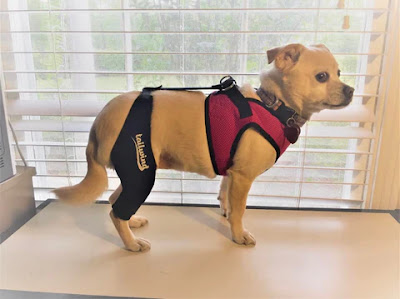The Benefits of Using Dog Leg Braces
Dogs can
experience a range of leg conditions, from injuries to degenerative diseases,
which can significantly impact their mobility and quality of life. In such
cases, dog leg brace
can plays a crucial role in providing support, stability, and pain relief.
These specialized devices are designed to aid in the management and
rehabilitation of various leg conditions, allowing dogs to regain mobility,
engage in physical activity, and lead a happier, more comfortable life. In this
article, we will explore the benefits of using dog leg braces for different leg conditions.
Cruciate Ligament Injuries
One of the
most common leg injuries in dogs is a torn cruciate ligament, particularly the
anterior cruciate ligament (ACL). Leg braces designed for cruciate ligament
injuries stabilize the knee joint, reducing strain on the damaged ligament
during weight-bearing activities. By providing support, dog leg braces can help improve healing, prevent further injuries, and
alleviate pain, allowing dogs to resume normal activities with reduced
discomfort.
Luxating Patella (Floating Kneecap)
Luxating
patella is a condition where the kneecap slips out of its normal position, causing
pain and discomfort during movement. Dog leg braces for luxating patella help realign the knee joint and keep the patella
in place, reducing pain and instability. Braces also aid in preventing
repetitive dislocations, which can lead to joint damage over time.
Hip Dysplasia
Hip
dysplasia is a genetic condition where the hip joint does not develop
correctly, leading to joint instability and arthritis. Leg braces for hip dysplasia support the hip joint, alleviate pressure on
the affected area, and promote proper alignment during movement. They help
reduce pain and inflammation, enhancing the dog's ability to walk and exercise
comfortably.
Arthritis
Arthritis is
a degenerative joint disease that affects many dogs, especially in their senior
years. Dog leg braces for arthritis provide compression and warmth to the affected joints,
which helps reduce pain and stiffness. The added support allows arthritic dogs
to move more freely and engage in light activities, maintaining muscle strength
and joint flexibility.
Fractures and Post-Surgery Support
After a leg
fracture or orthopedic surgery, a dog's leg needs proper support to heal
correctly. Leg braces can help stabilize the injured leg, protecting it from
further damage while promoting healing. They can also aid in managing
post-surgery swelling and inflammation.
Muscle Weakness and Paralysis
In some
cases, dogs may suffer from muscle weakness or partial paralysis due to spinal
cord injuries or neurological conditions. Leg
braces designed for these situations offer additional support, helping dogs
maintain proper leg positioning and assisting them in walking or standing.
Degenerative Myelopathy
Degenerative
myelopathy is a progressive disease that affects the spinal cord, leading to
hind limb weakness and loss of coordination. Leg braces for dogs with degenerative myelopathy can improve stability,
allowing affected dogs to maintain mobility and independence for longer.
CCL (Cranial Cruciate Ligament) Recovery
Dogs
recovering from CCL surgery or conservative management can benefit from leg braces during the rehabilitation
process. The brace provides controlled joint movement and support, aiding in
the strengthening of surrounding muscles and promoting a more successful
recovery.
Conclusion
Dog leg braces can be invaluable tools for managing a
variety of leg conditions and injuries, providing much-needed support,
stability, and pain relief. When used in conjunction with proper veterinary
care and rehabilitation, these braces can help dogs regain mobility, improve
their overall quality of life, and enjoy more active and pain-free days.
However, it is crucial to consult with a veterinarian before using any leg
brace to ensure proper fitting and suitability for your dog's specific
condition. With the right care and attention, leg braces can make a significant difference in the well-being of
our canine companions.










